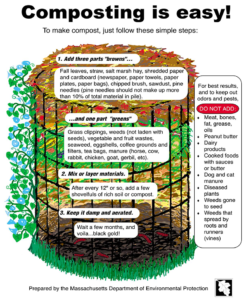Composting: Turn Spoils into Soil
Composting is a convenient, beneficial and inexpensive way to handle your organic waste and help the environment
What is Composting? Composting is a controlled process of decomposition of organic material. Naturally occurring soil organisms recycle nitrogen, phosphorus, potash and other plant nutrients as they convert the material into humus.
Composting is a convenient, beneficial and inexpensive way to handle your organic waste and help the environment.
 Yard wastes such as leaves, grass clippings and weeds make excellent compost. All fruit and vegetable scraps, plus food wastes such as coffee grounds, tea bags and egg shells can be composted. To keep animals and odors out of your pile, do not add meat, bones, fatty food wastes (such as cheese, grease and oils), dog waste and cat litter, or diseased plants. Do not add invasive weeds and weeds that have gone to seed.
Yard wastes such as leaves, grass clippings and weeds make excellent compost. All fruit and vegetable scraps, plus food wastes such as coffee grounds, tea bags and egg shells can be composted. To keep animals and odors out of your pile, do not add meat, bones, fatty food wastes (such as cheese, grease and oils), dog waste and cat litter, or diseased plants. Do not add invasive weeds and weeds that have gone to seed.
When the composted material looks like rich brown soil, it is ready to use. It can be mixed into the top few inches of soil before planting. Compost can be applied as a top dressing in the garden throughout the summer. Compost is excellent for reseeding lawns, and it can be spread ¼ inch deep over the entire lawn to rejuvenate the turf. You can put the compost through a screen to remove large particles – these can go back into the pile.
You can build your own simple compost bin from coated poultry wire or ½ inch hardware cloth, which will stand up and last longer. Unroll 12 feet of wire mesh and place circle where you want. Use metal clips or wire to secure ends. You may need to pound 3 or 4 poles into the ground snug against the inside to provide support. Layer your yard waste inside, adding a thin layer of soil or finished compost after each foot or so. You should use 2 to 3 parts of ‘browns’ – fall leaves, shredded paper, chipped brush, sawdust, or pine needles to one part of ‘greens’ – grass clippings, weeds without seeds, vegetable or fruit wastes, etc. When adding kitchen scraps bury them in the center of the pile. (Save a bag or so of leaves for summer months when they are not available.) With no effort besides occasional moistening, compost will be ready in 6 months to 2 years. Fluffing or turning the material with a hoe will hasten decomposition. You can also unlatch the circle, move it to a new location; unfinished material can be moved into it and finished compost at bottom used.
Earth Machine Compost Bins are available for purchase at the Manomet Transfer Station as well as at the DPW facility at 159 Camelot Drive for $43.00 each. These black plastic bins are rodent proof and have a removable door near the bottom that make it easy to remove finished compost. I have used one of these for a number of years. There are also rotating bins that can be purchased that are intended to aerate the material so it breaks down faster.
Information from the Composting brochure from MA Dept. Environmental Protection: https://www.mass.gov/doc/home-composting-tips-a-guide-to-composting-yard-food-waste/download
More info on composting at: https://www.plymouth-ma.gov/recycling/pages/compost-bins
Hazardous waste material collection day in Plymouth: October 30, 9am-1pm. You need to preregister using form on South Shore Recycling Cooperative website – http://ssrcoop.info/hazardous-waste/

Composting is awesome! We have two compost bins. One is full. We add to the 2nd on a daily basis. We keep a Rubbermaid plastic paint bucket in the kitchen to collect the daily contributions. It is remarkable how everything breaks down and becomes unrecognizable when you “harvest” your compost. Although, egg shells break down slowly. Be sure to add your fireplace ash.